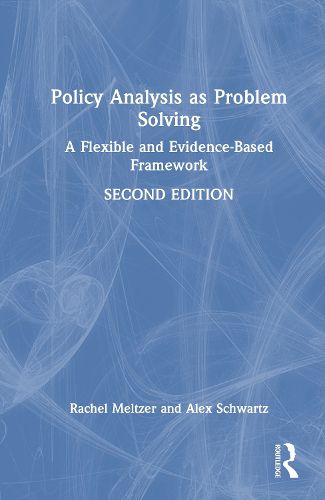Readings Newsletter
Become a Readings Member to make your shopping experience even easier.
Sign in or sign up for free!
You’re not far away from qualifying for FREE standard shipping within Australia
You’ve qualified for FREE standard shipping within Australia
The cart is loading…






In Policy Analysis as Problem Solving, authors Rachel Meltzer and Alex Schwartz provide a pragmatic yet fresh and original approach to the field. Emphasizing the importance of evidence and sound logic and drawing upon multiple perspectives and methods, the book guides readers through the process of making evidence-based decisions about policies. It offers a series of clear and comprehensive discussions about the key elements of the analytical process, beginning with steps to define the problem all the way until analysts arrive at a recommendation.
The authors break from traditional approaches in their embrace of analytical flexibility and illustrate a broader framework for thinking about policy, both empowering and equipping readers to marshal a diverse array of evidence, techniques, and evaluative criteria in their analyses. Case studies threaded throughout the book illustrate the different ways in which problems can be framed and the kinds of policies and criteria that may flow from these alternative framings. Focusing on child support, voter turnout, water shortage, and short-term rental platforms, they also reveal the challenges and imperfect conditions that analysts encounter in the real world.
Bolstered by an expanded scope, updates to its case studies, and refinements to its central arguments, the second edition of Policy Analysis as Problem Solving remains an excellent go-to resource for students and aspiring analysts in policy analysis and public policy courses.
$9.00 standard shipping within Australia
FREE standard shipping within Australia for orders over $100.00
Express & International shipping calculated at checkout
In Policy Analysis as Problem Solving, authors Rachel Meltzer and Alex Schwartz provide a pragmatic yet fresh and original approach to the field. Emphasizing the importance of evidence and sound logic and drawing upon multiple perspectives and methods, the book guides readers through the process of making evidence-based decisions about policies. It offers a series of clear and comprehensive discussions about the key elements of the analytical process, beginning with steps to define the problem all the way until analysts arrive at a recommendation.
The authors break from traditional approaches in their embrace of analytical flexibility and illustrate a broader framework for thinking about policy, both empowering and equipping readers to marshal a diverse array of evidence, techniques, and evaluative criteria in their analyses. Case studies threaded throughout the book illustrate the different ways in which problems can be framed and the kinds of policies and criteria that may flow from these alternative framings. Focusing on child support, voter turnout, water shortage, and short-term rental platforms, they also reveal the challenges and imperfect conditions that analysts encounter in the real world.
Bolstered by an expanded scope, updates to its case studies, and refinements to its central arguments, the second edition of Policy Analysis as Problem Solving remains an excellent go-to resource for students and aspiring analysts in policy analysis and public policy courses.